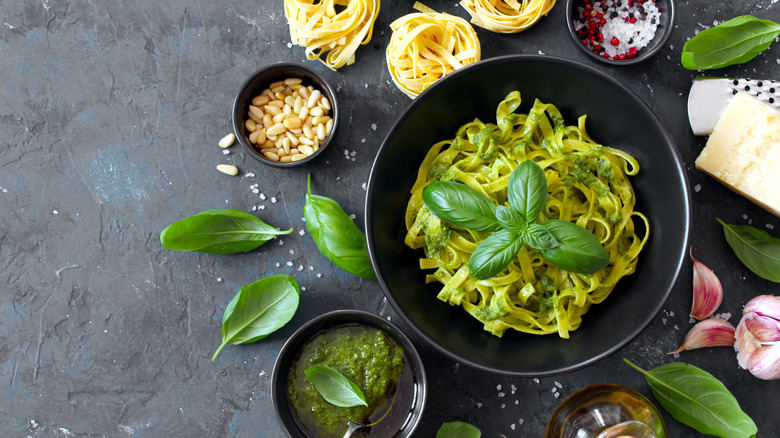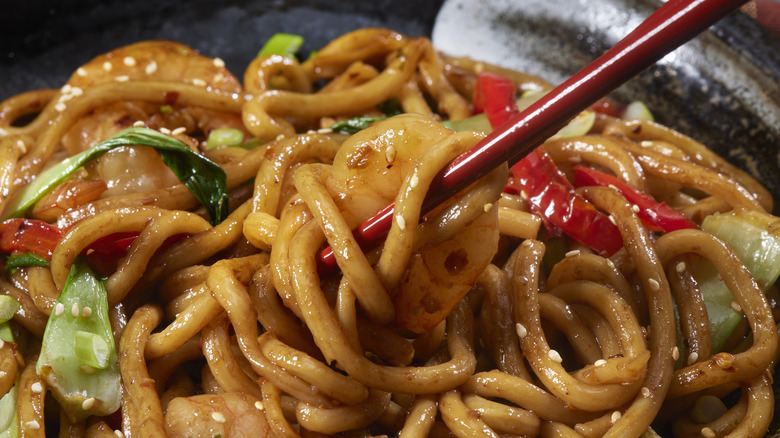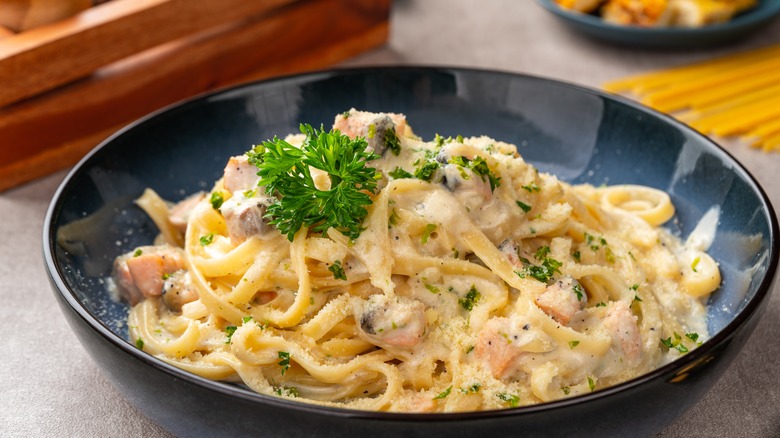It Turns Out The Origin Of Pasta Is Shrouded In Mystery
There are some foods that everyone in America seems to eat regardless of culture or background. Rice, potatoes, and chicken (for non-vegetarians) are good examples, but there's one that's probably an even better example: pasta. Even the pickiest kids will typically go to town on something like spaghetti and meatballs. There's just something familiar and comforting about pasta even to most people who balk at more challenging foods.
But the wild thing about pasta is despite its widespread popularity and clear associations with various cuisines (dozens of cultures, particularly in Europe and Asia, seem to eat something that at least shares conceptual similarities to pasta), its origins are largely unknown. Considering the number of foods whose surprising origins we actually know (both fried green tomatoes and fish and chips were originally Jewish, for example), it's remarkable that we don't know how or why pasta made its way to Europe. There are rumors, sure, but nothing can be definitively proven — and the main story everyone seems to believe was almost certainly invented after the fact.
Pasta probably wasn't brought to Italy by Marco Polo
The first place people think of when they think of pasta is Italy, which makes sense because pasta is a huge part of Italian cuisine. But how did it get there in the first place? There's a persistent rumor that pasta actually came from China via Marco Polo and the Silk Road, but this story is pretty apocryphal. It seems as though it is based on the fact noodles long predate the creation of pasta in the Mediterranean — but that on its own isn't enough evidence to give credit to Marco Polo.
But even if pasta did originally come from China (and it's certainly possible), it wasn't Marco Polo who brought it there. The telling of that tale relies on no original source documents; if Polo wrote a journal that talked about bringing pasta back along the Silk Road, we don't have a copy. Since he certainly wrote plenty of other recollections about his travels, there's no reason to favor the idea that kind of journal has been lost rather than that it simply didn't exist in the first place. It seems pretty clear this particular "fact" became popular not because there's evidence for it, but simply because it sounds good; it's the sort of thing told at parties as an interesting bit of historical trivia.
So how did pasta get to Italy if it wasn't Marco Polo?
Moreover, pasta was already gaining popularity in Italy and the Mediterranean in the 13th century when Polo was on his way to and from the Far East. Historians do believe pasta originated in Asia and eventually made its way to the West. While a convergent evolution scenario where both countries invented it independently is definitely possible, the simpler and more likely explanation is it started in Asia and eventually got to Europe. The Italian pasta-making process, while distinct from Chinese noodle-making, shares enough similarities in concept that this explanation becomes hard to ignore.
The problem is no expert can prove how, exactly, that happened. There are theories it came through the Middle East (meaning the Silk Road was still the most likely explanation, even though it didn't have to do with Polo), though if that happened, the Middle East was largely a stopover because pasta-making isn't nearly as prevalent among Middle Eastern cuisines as it is once you hit Romania and head west. And unless some new historical text gets unearthed, we're likely to never learn how, exactly, pasta got to Italy. Good thing the mystery doesn't put a damper on enjoying a bowl of carbonara.


